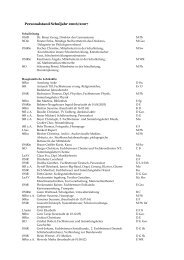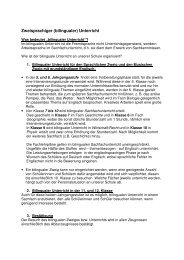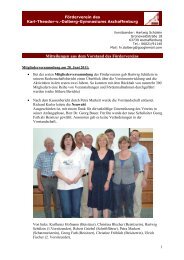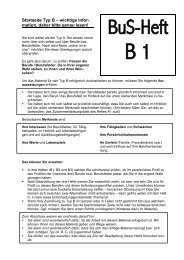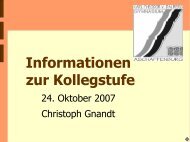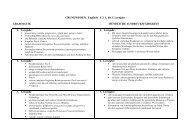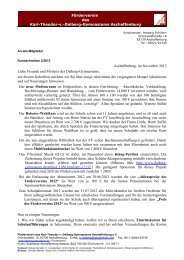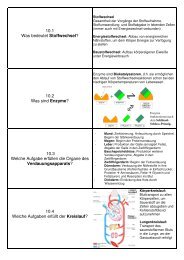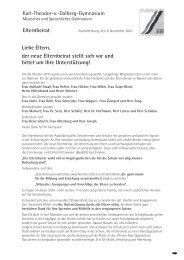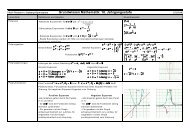GRUNDWISSEN GRAMMATIK E 1 - Dalberg Gymnasium
GRUNDWISSEN GRAMMATIK E 1 - Dalberg Gymnasium
GRUNDWISSEN GRAMMATIK E 1 - Dalberg Gymnasium
- No tags were found...
You also want an ePaper? Increase the reach of your titles
YUMPU automatically turns print PDFs into web optimized ePapers that Google loves.
<strong>GRUNDWISSEN</strong> <strong>GRAMMATIK</strong> E 11. Lernjahr:• present tense: simplepresent,present progressive• simple past• going to-future(rezeptiv)• Vollverben,Hilfsverben (be, have,do, can, must)• alle Satzarten,einfache Nebensätze,Kurzantworten• Singular, Plural, s-Genitiv; of-Genitiv• Artikel,Demonstrativbegleiter,Possessivbegleiter,indefinite Begleiter• Personalpronomen,Demonstrativpronomen,Interrogativpronomen,indefinite Pronomen• Adverbien des Ortes,der Zeit undHäufigkeit und derenStellung im Satz2. Lernjahr:• KonditionalsätzeTyp I• definierendeRelativsätze• question tags• modaleHilfsverben undihre Ersatzformen• past progressive• present perfectsimple• will-future, goingto-future• weitere indefiniteBegleiter• Relativpronomen• Adjektiv undAdverb: Bildungund Gebrauch,• I walk, he walks; I don ´t walk; he doesn ´t walk;do you walk• I am walking, he is walking• I walked, he walked: I didn ´t walk;did you walk?• I am going to walk• the, a/an; this/these – that/those - my, your etc. -some/any• he, she, it etc. – this/these etc. – who/what/why etc. –somebody, something etc.• If it rains, I´ll stay at home.• The man who lives next door is my uncle.• He likes English, doesn ´t he?• to be able to; to be allowed to, to have to• I was walking• I have just opened the window• It´ll probably rain. I´m going to fly to America nextweek.• a careful driver – to drive carefully; nice – nicer –the nicest;dangerous – more dangerous – the most dangerous
und Aspekt (Übersicht)• Substantiv: Fragen der Kongruenz,substantivischer Gebrauch des Adjektivs(Übersicht)• weitere wichtige Aspekte desArtikelgebrauchs (Übersicht)• He will be flying to Goatomorrow. By the end of JulyI will have finished myexams.6. Lernjahr• wichtige Grammatikgebiete in Verbindungmit der Textarbeit wiederholen (bes.Interferenzen)• wichtige Besonderheiten der englischenGrammatik kennen (z.B. Inversion,absolute Partizipialkonstruktionen;will/would; used to))<strong>GRUNDWISSEN</strong> <strong>GRAMMATIK</strong> E 21. Lernjahr• present tense: simplepresent,present progressive• simple past• going to-future• Vollverben,Hilfsverben (be, have,do, can, must)• alle Satzarten, einfacheNebensätze,Kurzantworten,question tags• Singular, Plural, s-Genitiv; of-Genitiv• Artikel,Demonstrativbegleiter,Possessivbegleiter,indefinite Begleiter• Personalpronomen,Demonstrativpronomen,Interrogativpronomen,indefinite Pronomen• Adverbien des Ortes,der Zeit undHäufigkeit und derenStellung im Satz2. Lernjahr• Konditionalsätze• I walk, he walks; I don ´t walk; he doesn ´t walk;do you walk• I am walking, he is walking• I walked, he walked: I didn ´t walk;did you walk?• I am going to walk• He lives in London, doesn ´t he?• the, a/an; this/these – that/those - my, your etc. -some/any• he, she, it etc. – this/these etc. – who/what/why etc. –somebody, something etc.• If it rains, I´ll stay at home.
Typ I• definierendeRelativsätze• einige wichtigeInfinitivkonstruktionen• modaleHilfsverben undihre Ersatzformen• past progressive• present perfectsimple• will-future• Passiv• weitere indefiniteBegleiter• Relativpronomen• Adjektiv undAdverb: Bildungund Gebrauch,Steigerung undVergleich3. Lernjahr• KonditionalsätzeTyp II und III,Temporalsätze,conditional• wichtige GerundundweitereInfinitivkonstruktionen• reflexive Verben;Verben mit zweiObjekten• present perfect(simple,progressive)• past perfect(simple,progressive)• condiitonal,conditional perfect• Reflexivpronomen,reziprokePronomen• Possessivpronomen• The man who lives next door is my uncle.• I don´t know what to do.• to be able to; to be allowed to, to have to• I was walking• I have just opened the window• It´ll probably rain.• I was invited by my best friend.• a careful driver – to drive carefully; nice – nicer –the nicest;dangerous – more dangerous – the most dangerous• If I had a lot of money, I would give it to the poor.If I had known that, I would have come at once.• Swimming is fun. I enjoy swimming. I aminterested in swimming. I don ´t know what to do.He asked us to wait. The first to come. It isimpossible for me to come.• I asked myself; to give somebody a book; to give abook to somebody• I have been learning English for two years/since2006.• I was late because I had been busy. They had been waitingfor an hour.• I would go; I would have gone• myself, yourself etc.• mine, yours etc.• He said he didn ´t like that book.
• Pro-Form one(s)• indirekte Rede• Adverb: weiterewichtige Aspekte4. Lernjahr• weitere wichtige GerundundInfinitivkonstruktionen• Partizipialkonstruktionen• Funktionen der –ing-Formen undAbgrenzung zu Infinitivkonstruktionen,• nichtdefinierende undsatzkommentierende Relativsätze, Mittelder Hervorhebung• future progressive, future perfect,Tempus und Aspekt (Übersicht)• Substantiv: Fragen der Kongruenz,substantivischer Gebrauch vonAdjektiven• weitere wichtige Aspekte desArtikelgebrauchs• remember doing/to do to• Feeling cold, I put on apullover.• I saw a bear walking; I noticeda man take a photo.• Muir, who was born inScotland, wanted to found anational park• He will be flying to Goatomorrow. By the end of July Iwill have finished my exams.• my family lives/live; the poor,the rich5. Lernjahr• wichtige Grammatikgebiete in Verbindungmit der Textarbeit wiederholen (bes.Interferenzen)• wichtige Besonderheiten der englischenGrammatik kennen (z.B. Inversion, absolutePartizipialkonstruktionen; will/would; usedto))



